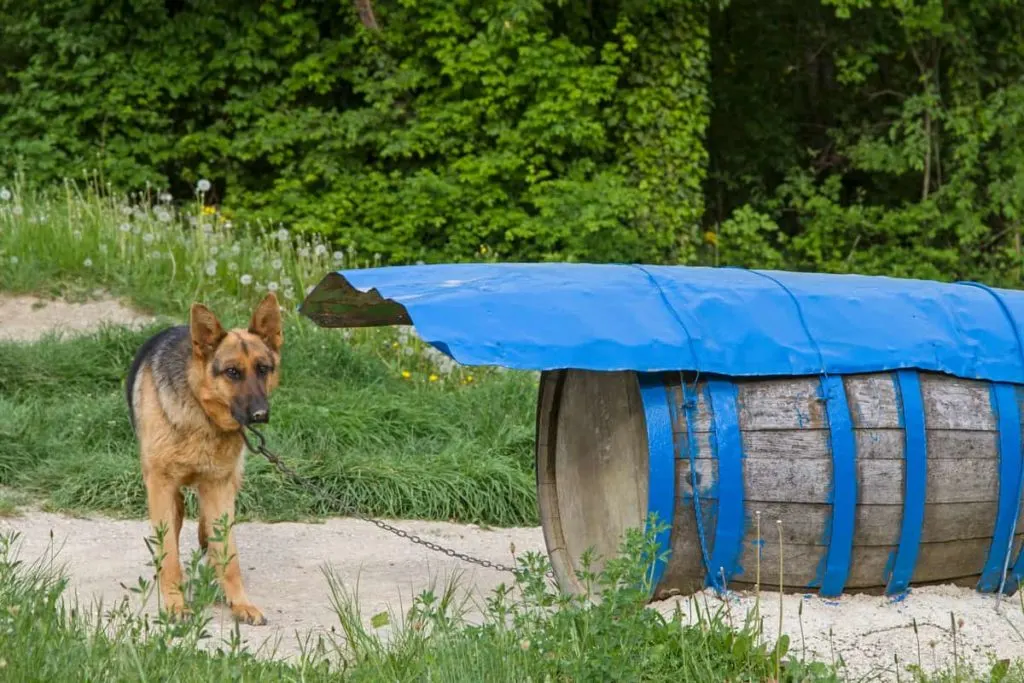
You may be reading this because you are thinking of welcoming a German Shepherd into your home. The question of keeping a GSD outside often comes up because, aside from being loyal, strong, and intelligent dogs, GSDs grow to be quite large and are infamous for their year-round shedding.
Because of their size and excessive shedding, people sometimes think that they can have the best of both worlds by owning a GSD, and not having to worry about a big shedding dog in their house if they just keep it ouside.
Other times this question arises because a person may already have a GSD that is being destructive or unruly inside of the owner’s home, or someone living in the home is allergic to the dog.
So, can you keep a German Shepherd outside? While it is possible to keep a German Shepherd outside, you should avoid doing so if at all possible. Keeping a GSD outside exposes the dog to unnecessary dangers and often results in a number of behavioral problems as well.
The vast majority of German Shepherd that are left outside are a result of the owner not putting enough effort into training and socializing their dog, possibly because they had unrealistic expectations around having a GSD in the first place because they failed to properly research the breed before they got one.
In this article, we will take a look at the reasons why you should not keep a German Shepherd outside, as doing so is most often very detrimental to the dog’s physical and mental health.
Click Here to Jump to a Section
Dangers of Leaving a German Shepherd Outside
Leaving a German Shepherd outside for shorter periods of time during the day is not necessarily a bad thing. Many GSDs actually prefer to be outside a lot of the time, as it’s good for their emotional and physical well-being. Being out in the yard gives a dog a chance to experience nature and all of its happenings.
However, there is a huge difference between allowing your GSD the outdoor time that it needs and likes so much versus using your yard as your dog’s primary domicile.
When we end our days, we typically lock up our homes and this gives us a feeling of security. It’s important to us that our families are kept safe from intruders, foul weather, and any number other of unknowns. But sometimes we may fail to consider that the safety measures that we take for ourselves and our family also need to be afforded to our dogs.
A dog left outside at all times is exposed to not only the elements but to a number of other dangers as well – both natural and unnatural. As far as weather goes – wind, rain, snow, and even the sun call all be potentially harmful or worse for your dog he is left outside in these conditions at all times.
Hot Weather
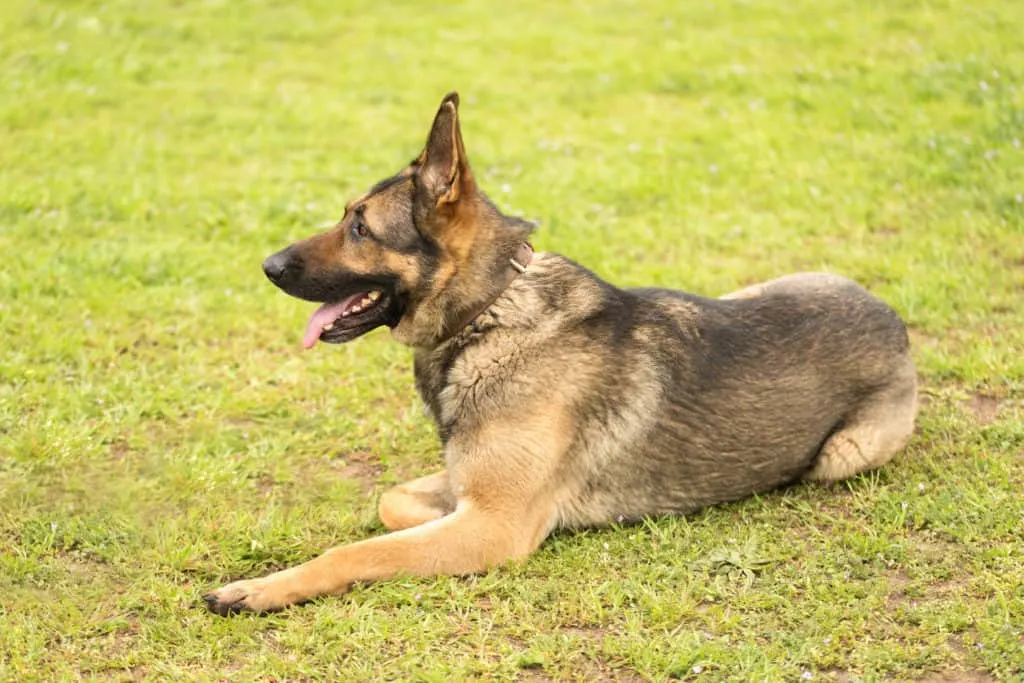
While German Shepherds are extremely adaptable to most any climate, they still need to be afforded certain levels of protection from the elements.
Here is an informative article about German Shepherds and temperature tolerance.
One of the most important things to be aware of if you have a GSD outside in the hot weather, especially if the dog does not have a standard Stock Coat, is that they can quickly overheat. This is true even if they are provided with adequate shade, food, and water.
Overheating can lead to heatstroke or dehydration, both of which can be fatal. If you do happen to have your GSD outside on a hot day for longer than you would prefer, carefully observe his behavior. GSDs will sometimes begin digging in the ground to create a cool spot for themselves to lay in. If you see this, you can be sure that it is far too hot outside for your dog’s safety.
Cold Weather
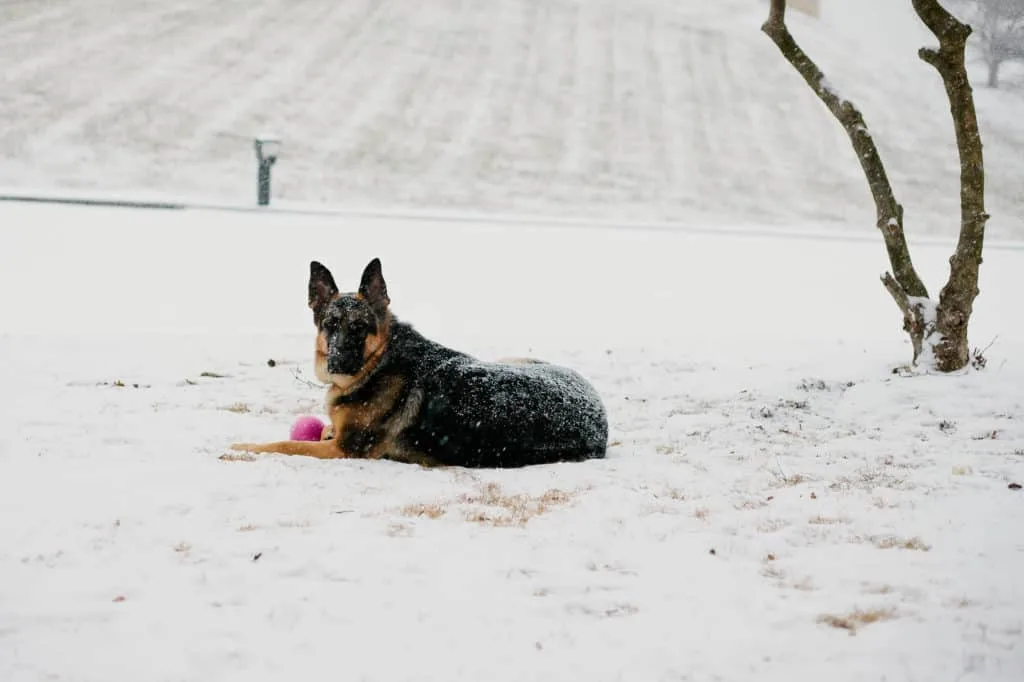
German Shepherds are actually very good cold weather dogs, spending time in cold weather and living outside in it are two entirely different things.
A GSD’s double coat does a tremendous job at keeping it warm in cold weather, but the danger is that if your GSD gets wet outside in cold weather, it will not have a chance to properly dry off which can then cause it to fall ill – it can even get frostbite if the weather is cold enough.
As long as a GSD can stay dry and out of the wind, it can stay outside in the cold for longer periods of time. But a German Shepherd that is forced to live outside at all times will not be able to do this.
Keep in mind that during times of extremely hot or cold weather, even if your GSD really enjoys being outside, he needs to have the opportunity to come back in from time to time to avoid getting too cold.
If it is an absolute must that a GSD be outside for an extended period of hot or cold weather, shelter is essential. The shelter should be insulated, waterproof, and able to block the sun’s rays. The size of the shelter should be just large enough for the dog to lie down comfortably, and in the wintertime keep it stocked with lots of warm blankets.
If you do find yourself in a situation that your dog must be outside for some time, just make sure that you do not leave your dog alone all night unattended. Should your dog fall ill due to either the heat or the cold, at least you will be in a position to catch it early and prevent even more undue hardship for your dog.
This is no different than a person enjoying the outdoors on a hot or cold day. Everything is fine in moderation, but excess can lead to trouble.
Wild Animals
You often hear of “dog attacks,” but the image that you probably picture is of a dog attacking another person or animal. But if you keep your dog outside, this picture can play itself out in reverse. And unfortunately, it happens more than you may think.
There are all sorts of animals that go out on the prowl at night. It may not be their intention to do any harm to your dog, but it is highly likely that they may cross paths and this can lead to an unpleasant outcome for your dog. There are also a number of animals that will directly seek out dogs and other domestic animals as a food source.
Groundhogs

These are large rodents (about the size of a very large cat). While they will not deliberately attack your dog for no reason, if they sense a threat, they will. They are fierce and can do a lot of damage with their sharp claws and large teeth.
You will often find groundhogs around newer housing developments, as the freshly dug earth is a perfect habitat for them. They are often a curiosity for larger dogs and will attack if a dog gets too close.
Skunks
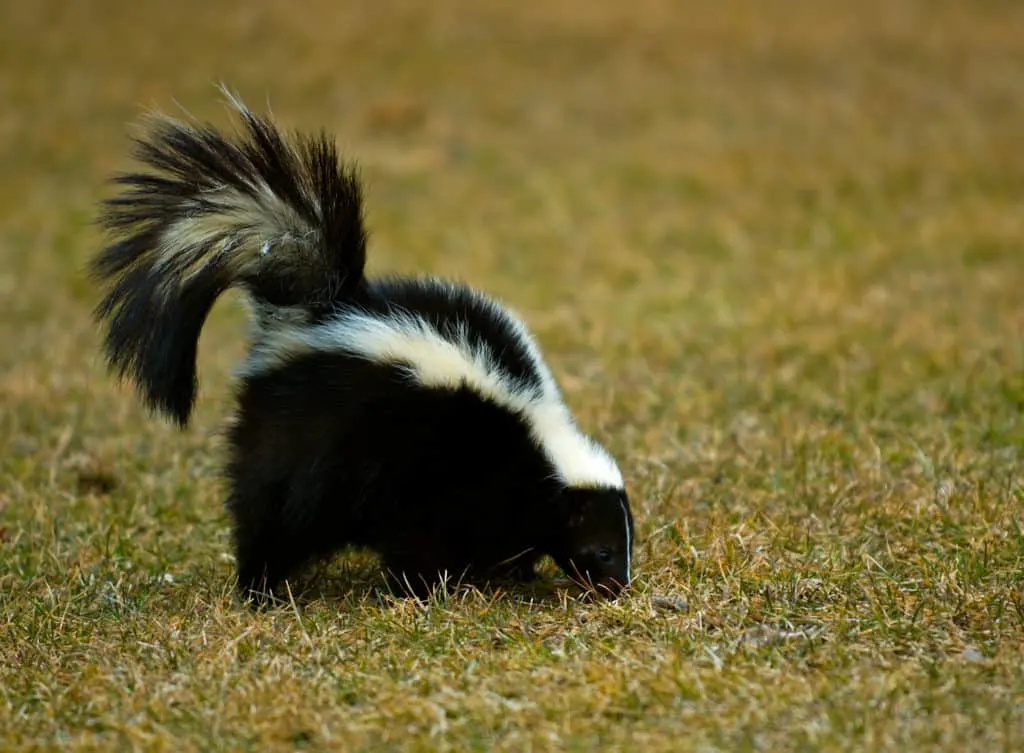
Even if you’ve never seen a wild skunk, chances are that you have smelled one. Skunks are nocturnal and they often wander through residential yards. If one crosses paths with your dog it will be surprised – and a skunk’s reaction to surprise is fright. A frightened skunk won’t hesitate to spray your dog, and perhaps even attack it with its claws and teeth.
Squirrels
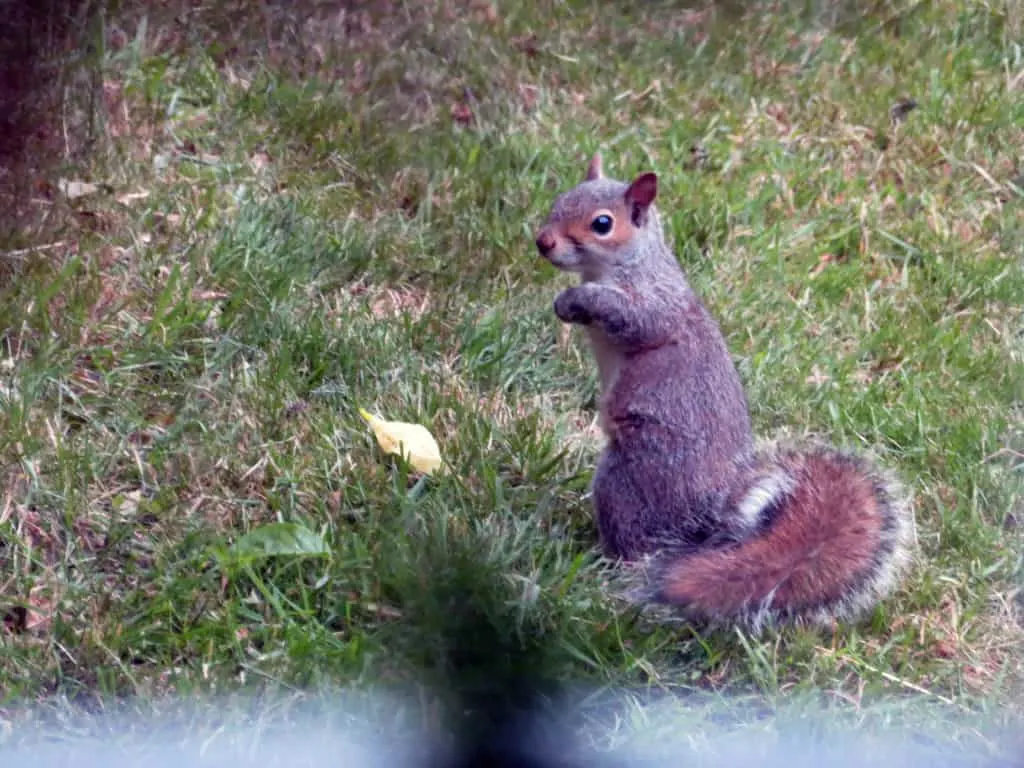
You’ve no doubt seen many a dog show an interest in chasing squirrels. Though they rarely catch them, they sometimes do. Chances are that a GSD will get the better of a squirrel, but not before the squirrel defends itself with its sharp teeth and claws.
Not only that, squirrels often carry diseases such as plague and Lyme disease. It’s not necessary for a squirrel to bite your dog to transmit these, as they can be transmitted from the blood of the animal if your dog bites one.
Raccoons

Like skunks, raccoons are also nocturnal. They hunt and scavenge, and they love the taste of dog food. It’s not uncommon for a person’s garbage cans to be ransacked by a raccoon.
They know that if there are people present, then there is probably food present as well. This knowledge, along with their curious and bold nature often brings them into contact with dogs being kept outside.
Raccoons are ferocious, they have strong claws and sharp teeth, and will not hesitate to defend themselves against a curious or aggressive dog. They also carry rabies so they can present a real danger on a few levels to a dog.
Snakes
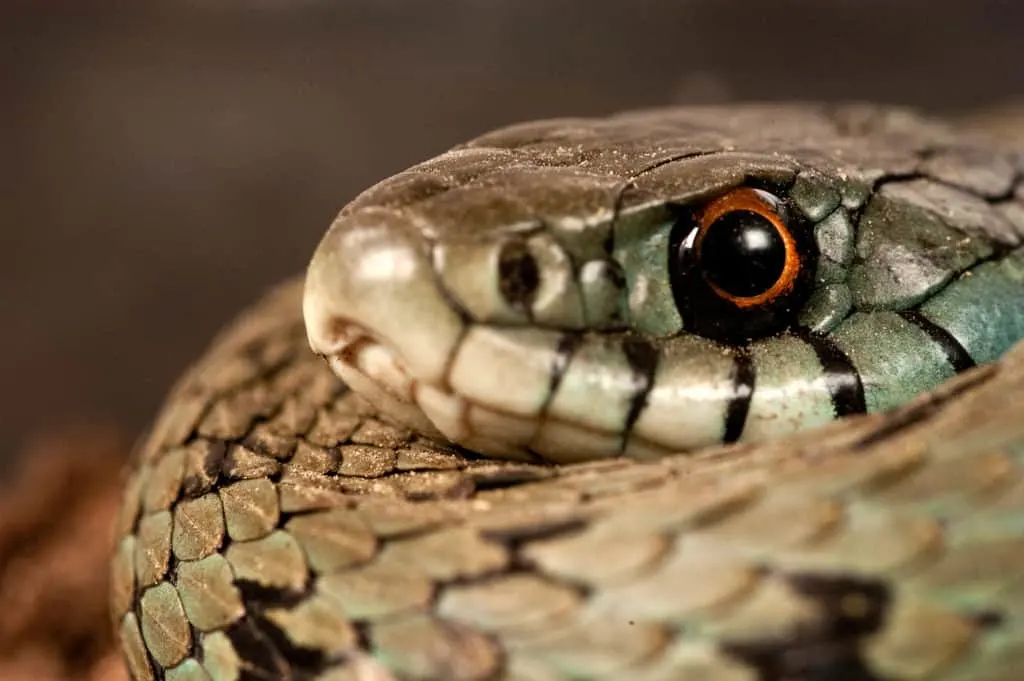
Because you don’t often see them, you may be mistaken about how present snakes actually are in your day to day life. The reality is that snakes are everywhere. If you have a backyard, you very likely have snakes burrowing in it.
While most snakes are not poisonous, some are very poisonous. And some of these poisonous snakes, like pit vipers and moccasins, do sometimes come into unintentional contact with a dog that is just sniffing around through the grass. Once a snake feels cornered, it will strike with often no warning, and it only takes one bite from some snakes to be fatal for a dog.
Coyotes
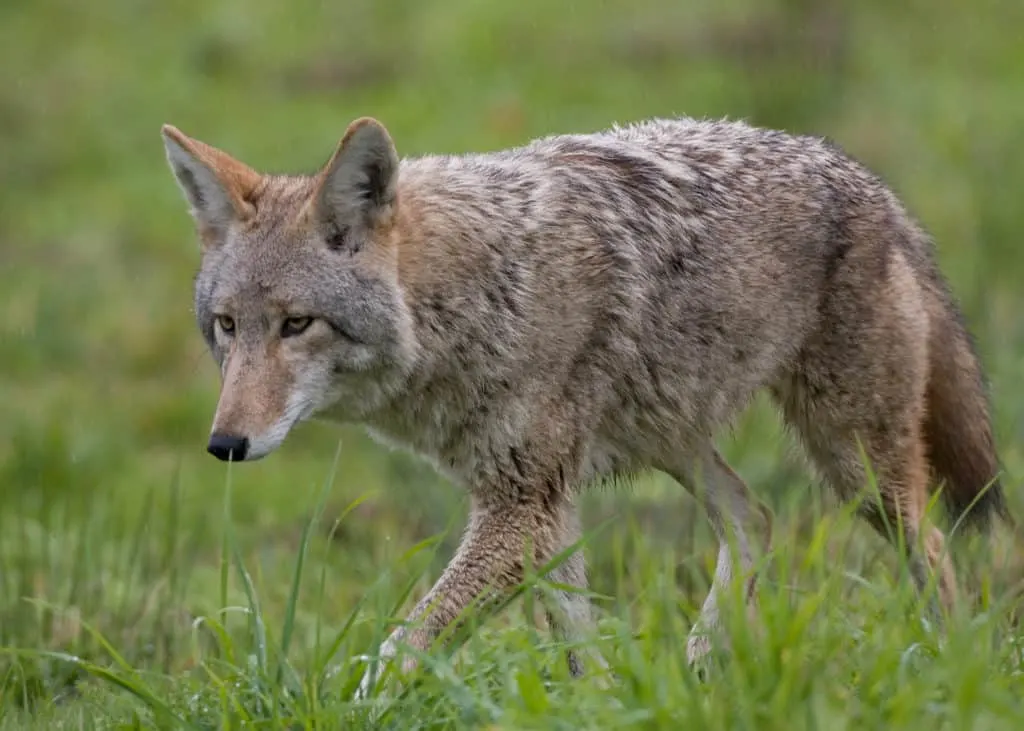
Watch out for these, as they are becoming more and more common in suburban neighborhoods. They are responsible for a huge amount of missing cats and dogs each year.
Coyotes are bold, they do not hesitate to attack, and they can easily gravely injure or even kill a large dog like a German Shepherd. If your dog is kept outside at night in a fenced-in yard or tied to something or the other, it will have no place to retreat. Another reason to keep your dog indoors.
Cougars (Mountain Lions)
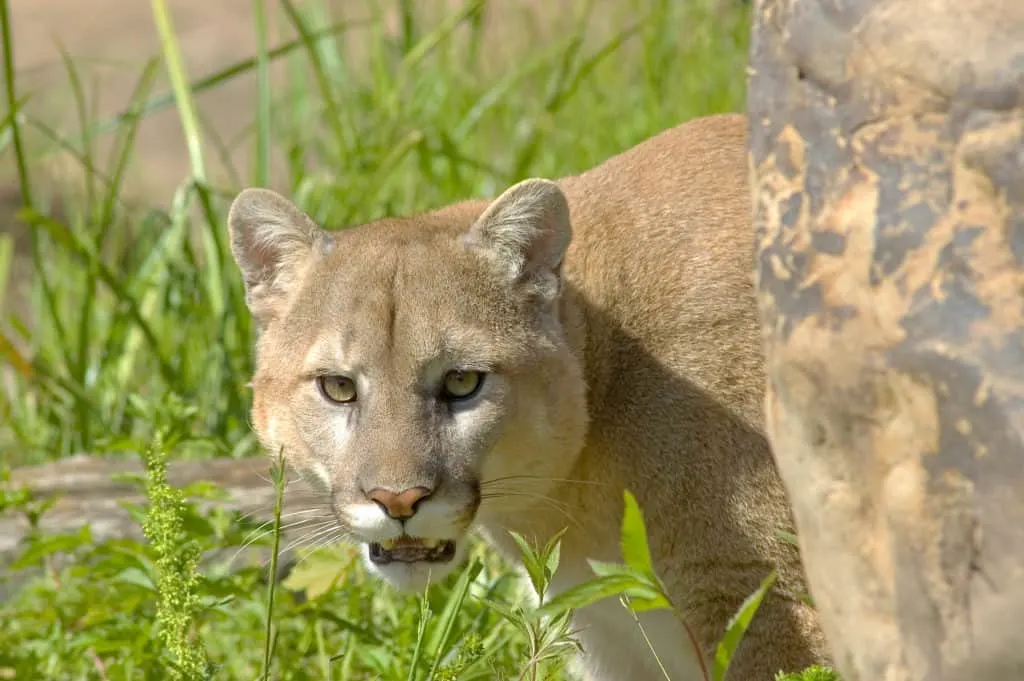
Like coyotes, cougars are also finding their way into neighborhoods. Loss of habitat and drought drives their natural prey to neighborhoods to forage, and the cougars follow. A cougar may at first stumble upon a domestic dog or cat by accident, but they soon find that they make for an easy meal.
Rats
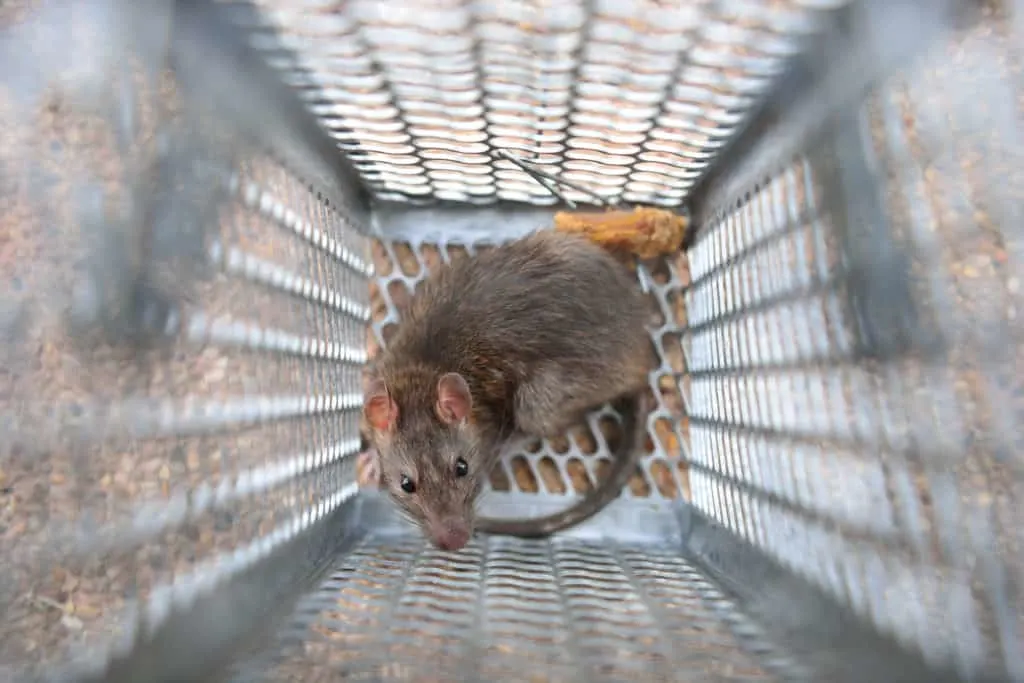
As unpleasant as they may be, rats are everywhere, and they’re not going anywhere either. They are here to stay, and they love to eat what you throw away, and they also love dog food. While a rat is highly unlikely to cause any serious bodily injury to a dog of any size, it’s the diseases that a rat can transmit that can cause illness and even be fatal to a dog.
Deer
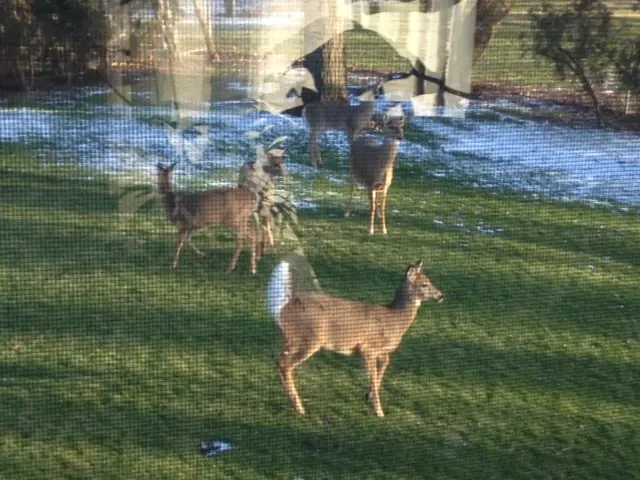
While they may seem majestic and harmless, deer can pose a real danger to domestic animals, especially dogs. Males have dagger-like antlers that and the hoofs on all deer can be deadly when used to attack a dog.
From about late March to early June, does (female deer) usually have fawns (baby deer) closeby. And like most animal mothers, a doe with a fawn will view anything that approaches as a threat and will not hesitate to be the aggressor if she senses danger to her baby.
Then from around mid-November until mid-January bucks (male deer) are in their “rut,” a time when they are looking for does to breed. Bucks are so focused on breeding during this time that they even forget to eat, and spend a lot of time fighting with other bucks for the right to mate with nearby females.
Deer are encroaching more and more into residential neighborhoods, and too often come into contact with domestic dogs. And because bucks view anything that gets in their way of breeding as a challenge, included dogs, there are unfortunately a fair number of dogs that are killed every year by bucks in rut.
German Shepherd Boredom and Destructive Behavior
German Shepherds are highly intelligent dogs, and one that is left outside will without question become very bored in a relatively short amount of time. They need a lot of mental stimulation to ensure their emotional well-being and being left outside severely deprives them of this.
A GSD that is bored will turn to most anything to occupy itself, and the most easily available form of expression for boredom is destructive behavior.
What this means for the owner of a dog that is left outside is that they can quite possibly end up with a yard that is literally in shambles. A bored GSD will dig holes all over the place. It will also find whatever it can to chew on.
Most often these items can be furniture, shrubs, hoses, sprinklers, storage containers – basically, anything that it can chew, it will chew.
A bored dog isn’t intentionally being destructive to prove a point, it is simply trying to find something that will occupy its time. So keep this in mind if your dog is spending a disproportionate amount of time outside, and perhaps see what you can do to give your dog some more time inside the house.
German Shepherd Separation Anxiety, Barking and Being a Rude Neighbor
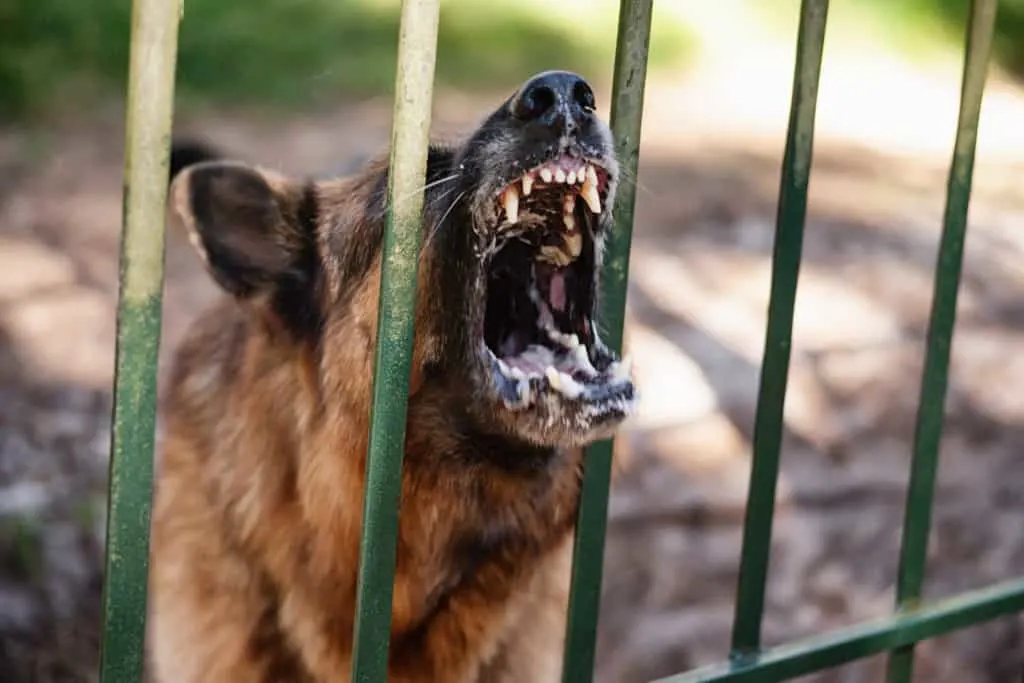
You may not notice it so much when your dog is barking because you are used to it, but just ask any one of your neighbors and they will no doubt tell you that they certainly notice.
Leaving a German Shepherd outside for long periods of time often results in excessive barking from the dog. This is because German Shepherds, more so than other breeds, are prone to separation anxiety.
Because GSDs love to be in the physical presence of their owners, being left outside will often trigger this anxiety, which often results in persistent barking.
While there can be multiple causes for separation anxiety, if a dog is left outside and is barking only while it is being left alone, you can be pretty sure that this is the cause of it.
In this circumstance, not only is a dog’s well-being compromised, but the lives of neighbors are certainly being intruded upon as well. It’s just not very neighborly to expose others living near you to the lonely cries and barking of your dog. The bark of a German Shepherd travels far, and can likely be heard further way than you may think.
German Shepherd Lack of Socialization
A German Shepherd needs to be well socialized in order to have healthy interactions and relationships in its life. This means that a GSD needs to be in contact with other people, animals, and new situations as much as possible, especially when it is younger.
If a GSD is kept outside and away from people for most of its time, it will not have this opportunity. This will very likely have a negative effect on the dog.
A GSD that is kept outside and away from meeting house guests and just interacting with you and your family in general on a daily basis will very likely begin to exhibit behavioral issues, including aggression.
This can be a hazard to mail delivery persons, meter readers, landscapers, or basically anyone that may require access to your property from time to time.
Too often dogs are kept outside as a result of their poor behavior due to a lack of socialization. But keeping a dog outside is not a solution to this problem, it instead only compounds it.
German Shepherds Need to Be with Their Pack
German Shepherds have an extremely strong pack instinct. They need to be with their pack as much as possible. And guess who their pack is? It’s you!
This means that they have the need to be physically close to you, and not kept outside and separated from you. GSDs also need you to lead the way in terms of showing them what’s right and what’s wrong. Without a strong and consistent leader, a German Shepherd will take that role upon himself – a role that he is not mean to play.
If a GSD is forced into a leadership role on his own, then he will literally take over and you can be sure that you will have a problem on your hands that can only be addressed with the assistance of a professional dog trainer.
German Shepherds have and instinctual need to be close to their pack to protect it, and one is cast away to live outside, he will have a skewed perception of what is his and what is not.
For example, an indoor GSD will be fiercely protective of your home because he views that as his job. But a German Shepherd that is kept outside in a yard will have a difficult time defining what is his to protect. And this will ultimately lead to a lonely, sad, and confused dog.
Final Thoughts
Remember that owning a German Shepherd is an “all in” situation. It’s a life commitment that needs to taken seriously. Treat getting a GSD as if you were adding a new member to your family because you are in essence doing just that.
German Shepherds are not easy dogs to take care of, and they will only flourish and be the loyal and hardworking dogs that they are known to be if you do your part and provide them with the shelter, safety, and companionship that they need.
As long as you take German Shepherd dog ownership seriously, you will be rewarded with a faithful and loving companion for years to come.
